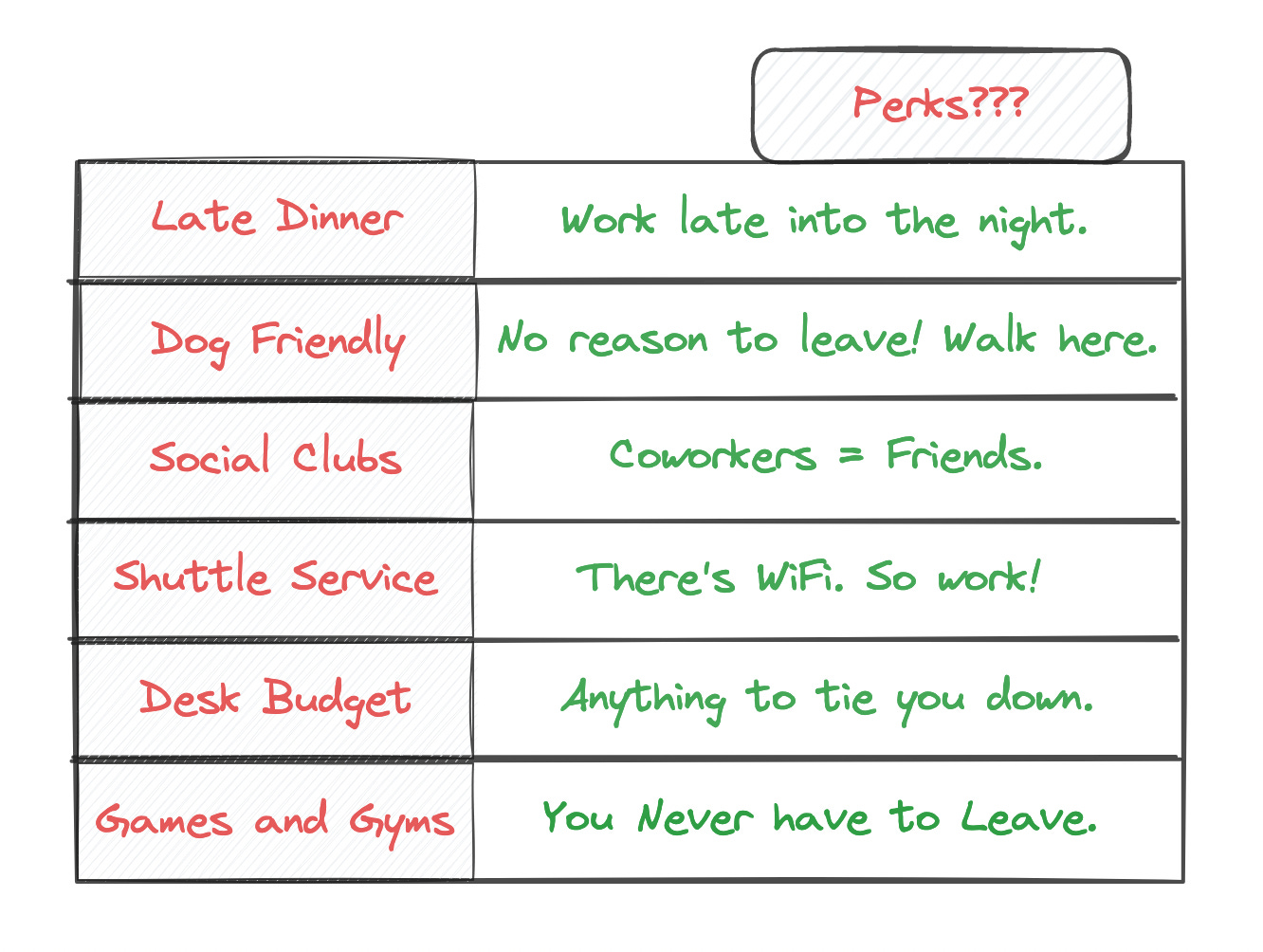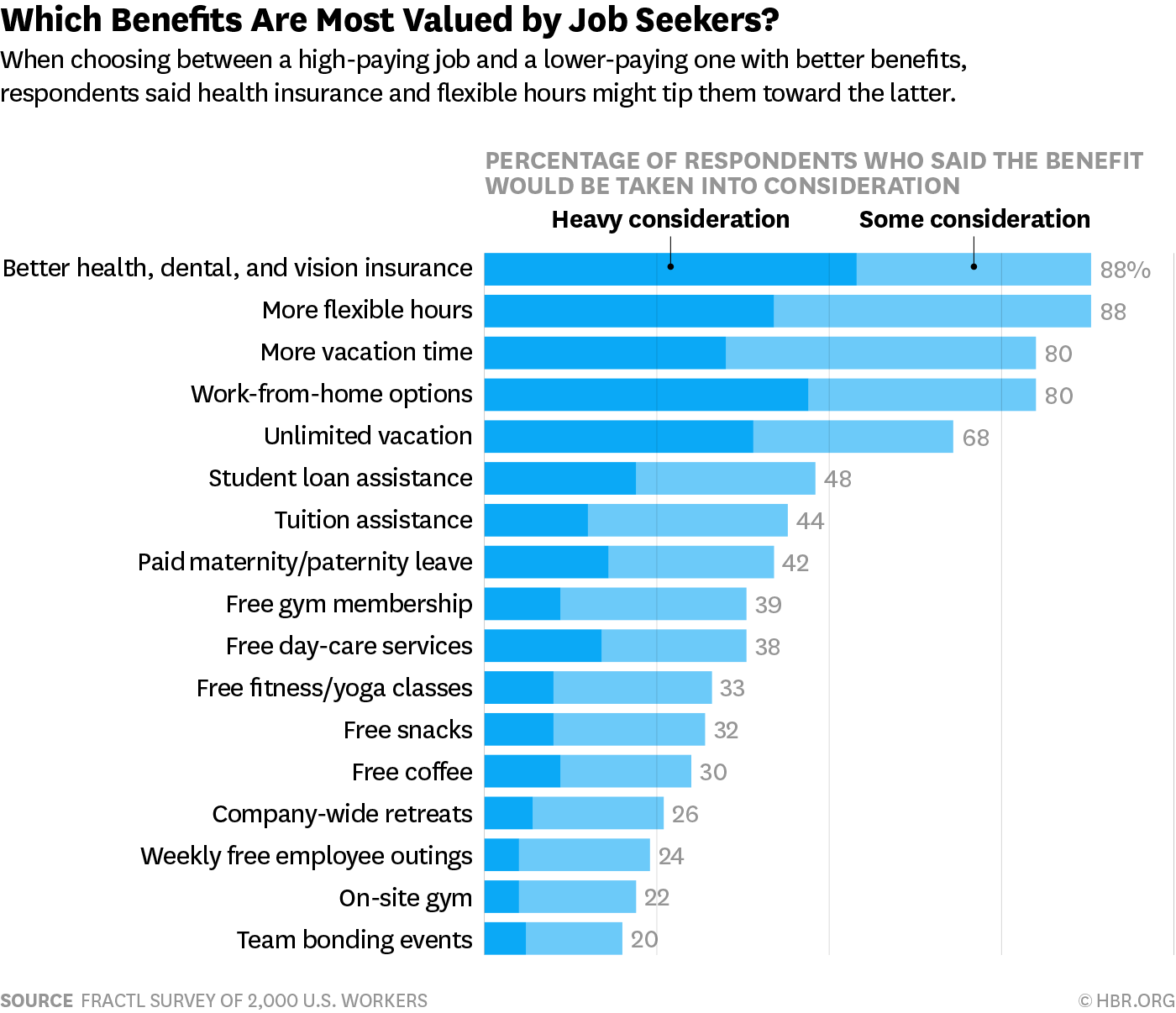Decoding Perks and Benefits
How Google and Big Tech enchanted a generation of white collar workers with flashy perks while squashing down very real benefits.
If you’re a 20-something-old graduate with a ginormous student loan, you may be excused if you didn’t look too closely at the employment contract. In fact, companies bet on the fact that they can make you happy with less. They sail through on the knowledge that entry level workers can be deluded with lower base pay and foosball tables.
When I first started working I had no idea what a 401(k) was. I hadn’t heard of HSAs, Insurance Premiums and Student Loan Repayment Matches either.
My employer was more than happy to leave me in my ignorance. Once a year, the HR would start hounding us about stating “our elections“ but they would never explain why they matter. Maybe if you’re lucky enough to come from a wealthy family or one that talks about money, you would know what to do. But the rest? We tend to miss out, especially in the beginning. In the language of the employers it makes sense: the lesser number of people sign up for 401(k) matching, the lesser money they would lose.
Only after TWO years, did I understand the benefit of a retirement plan and an employer match. Temporary residents like me are also forced to contribute to Medicare and Social Security, when there is no guarantee that we would be allowed to stay in this country beyond the next month.
That was when I decided to delve deeper into this topic. Which of these employee benefits benefit the employee?
I. Perks
Perks are the nice-to-haves. They make up a nice attractive list that HR reps love to flout around during interviews but don’t contribute much to employees’ well-being. Perks are employed as shiny decorations to mask the stressful reality of white collar jobs. Indeed, perks may help the employer more than the employee. They are tools used by organization to distinguish oneself from the competition and appear laid-back and caring without putting in any of the hard work involved in creating an equitable workplace.
One has to look twice and think thrice to decode the true reasoning behind the perks. In 2022, an ex-Google employee famously exposed the hidden coercions shadowing the famous perks available at Google’s Silicon Valley campus. Some of which can be seen below.
If you look closely you would see how many of the perks are tailored to make you stay longer at the office. This is one of the main reasons remote work can never take off amongst the tech behemoths. Big Tech is too entrenched in the way they used to work. They plotted, designed, and developed the campuses in such a way that employees would work long hours and help boost productivity. They have invested too much in real estate and cannot walk away from the demands of the wealthy landlords.
Coming back to the woes of the worker. Let’s consider a typical day at the office:
The shuttle services start at 7 am and end at 10 PM. The shuttles come with WiFi and filled with employees who feel obliged to work or chat about work. Next, the workers amble into their office and catch a quick breakfast. Again, they are carefully immersed into the work environment and prepped to start the day. Breakfast can end by 9 am, gently prodding the employees into coming into work early. And if you are a parent who needs to drop kids off / figure out other arrangements - no breakfast for you!
Sometimes lunch is free. Sometimes it’s not. But what they don’t allow you to free up is your attention. Lunch time can simultaneously be filled with “Lunch ‘n‘ Learns“, social “Get-to-Knows”, and worse, actual meetings. If you want to eat on your own and sit out the hoopla, you’ll have no choice but to eat at your desk. Which gives you more time to - guess what - work.
I used to beg my HR to allow me to bring my dog into work because I had to leave early in order to walk her. Ending the day early wasn’t reflecting well on me at work. It stood for a certain degree of laziness, insolence, and a clear rejection of the norms set by my co-workers. In that scenario, bringing my dog with me sounded like a good counteract. But upon further research and observing my own dog, I concluded that she wouldn’t want to spend the whole day trapped with me, surrounded by curious coworkers, and the constant click-clacking of keyboards. Besides, how can I take her with me to all the innumerable meetings? Or to the lunch area if I wished to eat with my colleagues. My dog will suffer from an irregular schedule and I would be forced to “miss out“ in other ways. And so, I dropped the notion of “dog-friendly“ workplaces and continued leaving early.
Most of the other perks that are on-site - like gyms, table tennis, and more - are designed to keep you inside the building for longer. If you have no reason to leave, then you will stay. If you stayed, the peer pressure and environment will cajole you into doing just a little bit more work. And in my experience, I’ve seen people play for 20 minutes “After-5“ and then go work for 40 minutes more.
Instead of going home.
Interestingly (or perversely), playing and engaging in social clubs at the office try to take advantage of your sense of belonging. The more time you spend with your coworkers, more you like them, and the more you are willing to work with them. I agree that its nice to chat with your colleagues. But if one’s entire social circle consists of coworkers, then we have a problem.
The world you inhabit grows smaller and smaller. Only when we talk and speak to people from different strata of society do we develop empathy and an understanding of the world beyond our narrow lives. I can personally attest to how enriching it is to make friends outside of your work, your age-group, and your income bracket.
Moreover, there is no guarantee how long your co-worker will stay at the job. Most work friendships tend to dissolve once contact ceases. Who wants to make new friends every year?
II. Benefits.
Wait, if perks aren’t working to a worker’s advantage then what is?
BENEFITS!
That’s right. There is a difference.
Before one signs on the dotted line, it is very important to look through the provided benefits. Because these benefits can actually contribute to your long term well-being. Benefits include retirement matches, life insurance, health, dental and vision insurance, HSAs, flexible work arrangements, Paid Time Off and Sabbaticals.
Benefits contribute to your physical, mental and financial health. As an employee, it’s important to take advantage of every single benefit available to you. In most cases, employers are required by law to provide these to you. So don’t be like me. Don’t miss out!
In Conclusion,
I agree that perks can be useful. But it’s up to you to discern the true meaning behind some of these perks and then decide your level of engagement with it. If you can take advantage of something, go for it! Just don’t work more for it.
On the other hand, dig deep to learn about your benefits and make use of them. Hound your HR manager, speak to your supervisor. Learn from whoever you can. Get that 401(k) match!
An easy rule of thumb: If they gloss over the details, then it matters. If they harp on about something and hype it up, then it really doesn’t.






